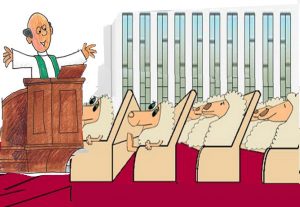John 10.1-18

Jesus made many bold claims and John’s gospel is particularly noted for his “I am” statements. Chapter 10 connects two of these: ‘I am the door of the sheep,” John 10.7,9 and ‘I am the good shepherd’. John 10.11,14 Jesus mixes metaphors whilst telling and then explaining his parable. The sheepfold represents God’s people or the kingdom of God. The thieves and robbers who climb in over the sheepfold wall are the multitude of false “messiahs” that abounded before and during the first Century but it also included the Pharisees who belittle or expel genuine seekers after God’s kingdom such as the healed man in the previous chapter. False messiahs or prophetic figures still persist and so the parable remains highly relevant today. A false messiah does not have to be an individual it can equally be a philosophy that provides false hope and promises. Jesus provides us in this parable a way of discriminating between them and the kingdom of God.
Being in the kingdom of God is about belonging to him, the good shepherd. He twice asserts that special relationship. ‘The sheep hear his voice, and he calls his own sheep by name and leads them out.’ v3 and ‘I am the good shepherd. I know my own my own and my own know me’. v14 Being in the kingdom of God is about being in relationship with Jesus. It is not just about belonging to a wider group, each member is in individual relationship with him. They are individually known and named, he calls them by name. Each person is known, counted, named, sought after, cared for and loved. His sheep follow him because they know his voice. If they do not know his voice then they are not part of the flock. Beyond that a characteristic of being in the kingdom of God is the rejection of false messiahs, teachers or prophets. Jesus says his own will not follow them but will in fact flee from them. How does this impact our lives today? What are the influences on our lives, our choices, the people we listen to? Are these people who guide us in the direction of Christ and lives set apart for him? Are these spiritually healthy people?
Jesus in the same teaching mixes metaphors and says he is not only the shepherd, he is the door vv2,7 and the gatekeeper. v3,9 The only way in to the kingdom of God is through him and by him. Jesus accompanies this with a promise, ‘If anyone enters by me, he will be saved and will go in and out and find pasture’. v9 When considering a promise and weighing it against other promises we should consider who the promise maker is. Jesus’ promises are made by the eternal God who has demonstrated his love for us through his preparedness to go through death for us. Jesus was not only prepared to lay down his life and then take it up again for us but he was actually capable of doing it. There is no price he was not prepared to pay for our sake and that differentiates him from all other false promisers. ‘For this reason the Father loves me, because I lay down my life that I may take it up again. No one takes it from me, but I lay it down of my own accord. I have authority to lay it down and authority to take it up again’. vv17,18
Jesus once again warns about false messiahs, describing them as those who will not be prepared to pay the ultimate price for the sake of the kingdom of God. v12 The underlying security for the followers of Jesus is the bond between him and God the Father. Jesus is fulfilling the Father’s will because of their mutual love. ‘For this reason the Father loves me’ v17 … ‘This charge I have received from my Father’. v18
Followers of Jesus then should take great comfort and confidence from Jesus’ promise. We should be careful to listen to his voice through his word for our guidance. We should flee from false prophets and ultimately the test of falseness is whether they are directing us towards Jesus alone. Our trust is to be personal and this is why Christians speak of a personal relationship with God. No other faith conveys such an intimacy of relationship. Jesus speaks in this passage about a spiritual life that is totally fulfilling not just in terms of stretching into eternity but in it being as the ESV translates, abundant. v10 In pictorial terms Jesus describes it as saved sheep going in and out finding pasture. v9
How has this passage challenged us about who we listen to?
Do we ask the Holy Spirit to continue to build our confidence in the promises of Jesus?
Shepherd of my soul
